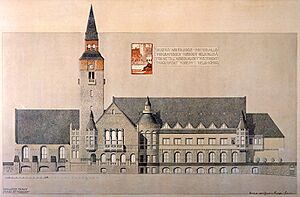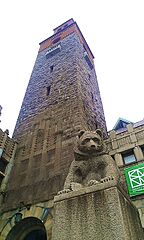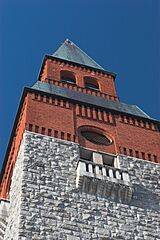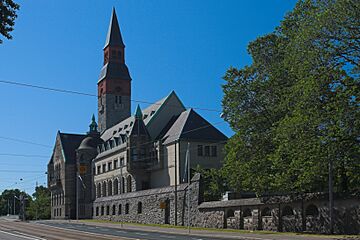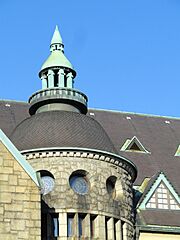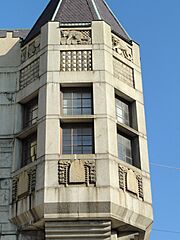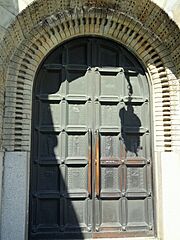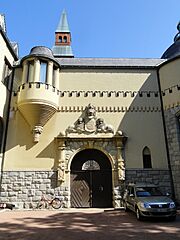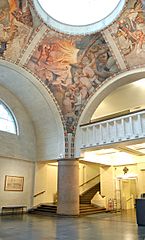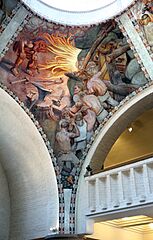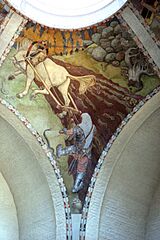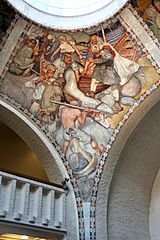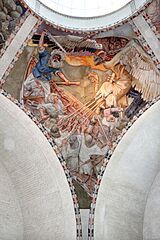National Museum of Finland facts for kids
Quick facts for kids National Museum of Finland |
|
|---|---|
|
Suomen kansallismuseo
Finlands Nationalmuseum |
|
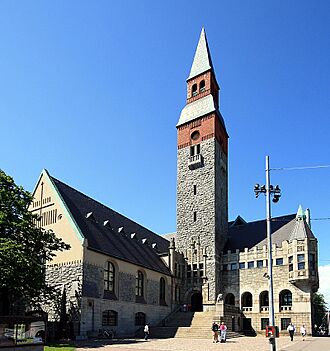
National Museum of Finland
|
|
| General information | |
| Classification | Museum |
| Location | Helsinki, Finland |
| Address | Mannerheimintie 34 |
| Coordinates | 60°10′30″N 24°55′46″E / 60.1749°N 24.9294°E |
| Construction started | 1905 |
| Construction stopped | 1910 |
| Opened | 1916 |
| Client | Board of Public Building |
| Owner | Senate Estates |
| Height | tower 58 m (190 ft) |
| Technical details | |
| Floor area | Exhibition area more than 3,100 m2 (33,000 sq ft) |
| Design and construction | |
| Architect | Gesellius, Lindgren, Saarinen |
| Main contractor | Master Builder August Pettersson and Master Builder Frans Johansson |
The National Museum of Finland (Finnish: Suomen kansallismuseo, Swedish: Finlands Nationalmuseum) is a special place in Helsinki, Finland. It shows the whole story of Finland, from the very first people in the Stone Age all the way to today. You can see many old objects and learn about Finnish cultural history.
The museum building itself is very interesting. It was built in a style called National Romantic style. This style often uses ideas from old Finnish buildings. The museum is located in central Helsinki and is part of the Finnish Heritage Agency.
Right now, the National Museum is closed. It is getting a big makeover and a new part is being added. It was planned to open again in 2027. However, due to money cuts by the government, the opening has been put on hold.
Contents
The Museum Building
The National Museum building was designed by a group of architects. Their company was called Gesellius, Lindgren, Saarinen. The building looks a bit like Finland's old stone churches and castles. This style is known as national romanticism. Inside, you can see many details from the Art Nouveau style.
The museum was built between 1905 and 1910. It first opened its doors to visitors in 1916. After Finland became independent in 1917, the museum was officially named the Finnish National Museum. It had a big renovation and reopened in July 2000.
- Details of the building
-
Another turret with animal reliefs
When you enter the museum, look up! The ceiling in the main hall has beautiful paintings called frescoes. These paintings tell stories from the Finnish national epic, the Kalevala. You can see these amazing artworks without even paying to enter the museum. The artist, Akseli Gallén-Kallela, painted them in 1928. They are based on earlier frescoes he made for the Paris World Fair in 1900.
- Akseli Gallen-Kallela's 1928 frescoes in the entrance hall
-
Ilmarinen Ploughing a Field of Vipers
What You Can See: Exhibitions
The National Museum has many different permanent exhibitions. They are set up to show different parts of Finnish history.
You can explore collections of old coins, medals, and special awards. There are also displays of silver items, beautiful jewellery, and weapons. One part of the museum focuses on Finland's prehistory, showing what life was like before written records.
Other exhibitions cover how Finnish society and culture grew over time. This includes the period from the Middle Ages (around the 12th century) through the time when Finland was part of the Swedish Kingdom. It also covers the time when Finland was part of the Russian Empire, up to the early 20th century. You can also learn about Finnish folk culture from the 18th and 19th centuries. This shows what life was like in the countryside before factories and machines became common.
The museum also had a special collection of items from Mesa Verde National Park in Colorado, USA. These were found in ancient cliff dwellings. A Finnish explorer named Gustaf Nordenskiöld gave them to the museum. This was one of the largest collections of Native American items outside the Americas. In 2019, it was decided to return some of these items to the Native American people. About 600 items will stay at the museum to be shown to the public.
An Event in the Silver Room
On January 23, 2006, a small explosion happened in the museum's Silver Room. It was caused by methane gas that leaked from a pipe under a nearby street. The gas got into a cleaning closet and was lit by a spark.
Most of the display cases and 49 silver objects were damaged. However, most of the damage was minor. Luckily, no one was hurt in the incident. All the damaged items were fixed in the same year. The Silver Room was reopened to visitors in early 2007.
Images for kids
-
Alexander I's seat used at Diet of Porvoo, originally commissioned by Paul I at St. Petersburg in 1797
See also
- Elk's Head of Huittinen, an eight to nine thousand year old sculpture exhibited at the museum.
 | William M. Jackson |
 | Juan E. Gilbert |
 | Neil deGrasse Tyson |


